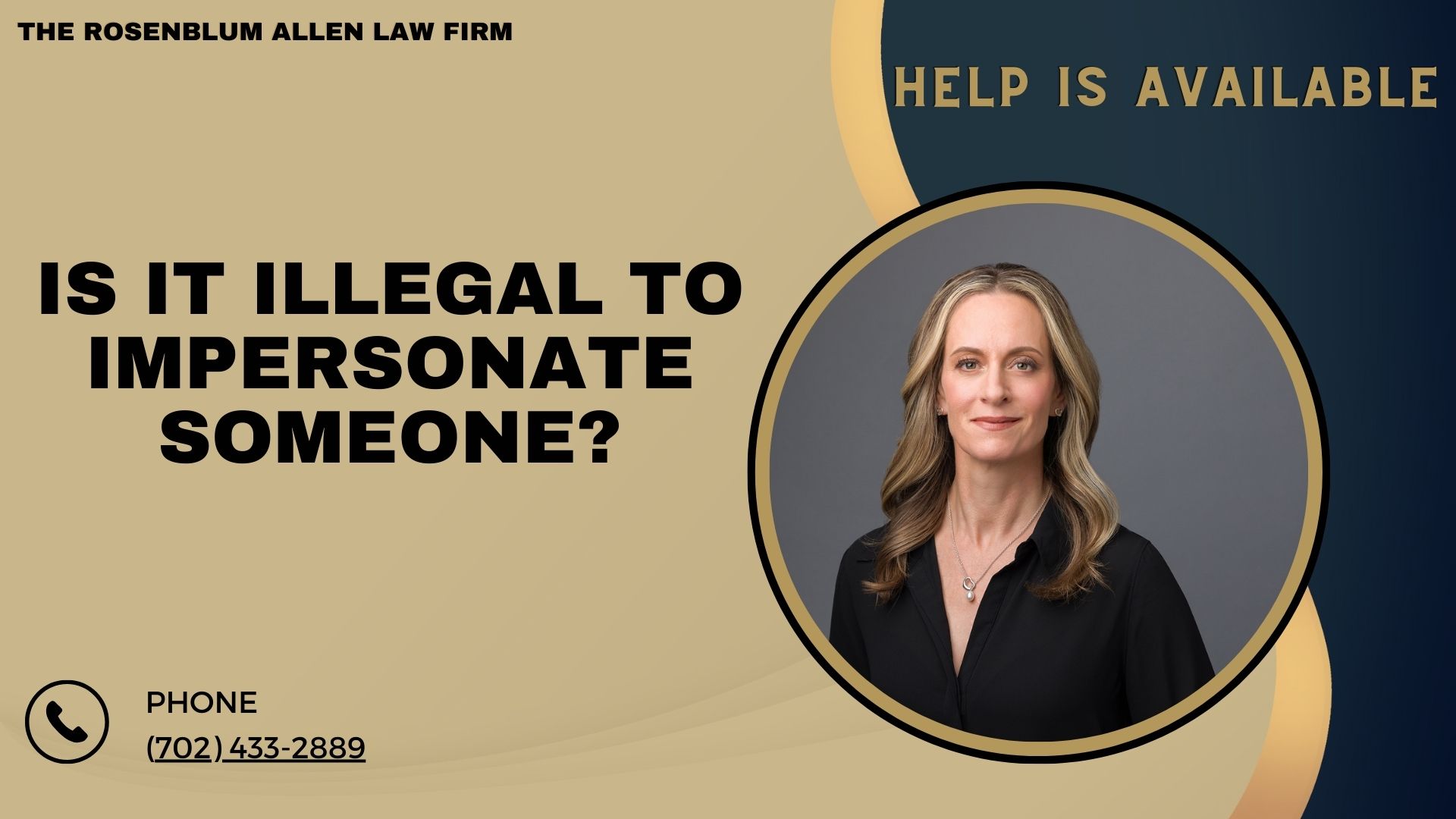Have you ever wondered about the thin line between a harmless prank and a legally iffy impersonation? In a world of social media, we can easily slip into different personas. So, it’s crucial to understand the laws around impersonation. This article sheds light on what counts as impersonation. It covers its legal limits and why it’s essential to stay informed.
 What Constitutes Impersonation?
What Constitutes Impersonation?
Impersonation can range from mimicking a friend for a harmless laugh. It can go to assuming someone’s identity for nefarious purposes. But when does this act become illegal?
Definition and Examples of Impersonation
At its core, impersonation involves pretending to be someone else. This is often without permission. This can occur in various contexts:
Real-life vs. Online Impersonation: Pretending to be someone else in person, like mimicking a friend, vastly differs from creating a fake online profile to deceive others.
Examples include:
Pretending to be a celebrity on a call-in radio show (real-life)
Creating a social media account under someone else’s name (online)
Differentiating Between Harmless Impersonation and Illegal Activities
Not all acts of impersonation are illegal. The distinction often lies in the intent and the outcome:
Harmless Impersonation: Dressing up as a historical figure for a party.
Illegal Activities: Using someone’s identity to apply for a credit card.

Legal Framework Surrounding Impersonation
The laws against impersonation are meant to protect people’s identities and reputations. They shield them from unauthorized and harmful use. But these laws can vary significantly.
Overview of Laws Against Impersonation
The legal framework includes:
Federal Laws and Statutes broadly address identity theft and fraud across state lines.
State-Specific Laws and Variations: Laws can differ significantly by state, with some focusing more on digital impersonation.
International Laws on Impersonation
Globally, countries approach impersonation with varying degrees of severity. Some have strict laws. Others may be developing them. They want to address the challenges of the digital age.
The introduction and first few sections aim to lay a strong foundation. They focus on impersonation. They blend legal insights with relatable examples. The writing style is engaging and clear. It makes complex legal concepts easy to understand for everyone.


Types of Illegal Impersonation
Let’s explore the various forms of impersonation. They cross the legal boundary. Understanding these can help recognize potential risks and take preventive measures.
Identity Theft
This is a common and severe form of illegal impersonation. Someone illegally obtains and uses another person’s data. They do so through fraud or deception. This is typically for economic gain.
Financial Fraud: Using someone’s identity to open bank accounts, apply for loans, or make unauthorized purchases.
Medical Identity Theft involves using someone else’s identity to receive medical care, prescription drugs, or false claims.
Impersonating a Public Official
Impersonating public officials undermines trust in public institutions. It can lead to serious legal trouble.
Police Officers: Illegally wearing a police uniform or flashing a badge to exert authority.
Government Officials: Falsely claiming to be a government agent to gain access to restricted information or spaces.
Impersonation for Personal Gain
Beyond identity theft. Impersonation can be used to enrich oneself at the expense of others or to gain undue advantages.
Employment Fraud: Using a fake identity to secure a job or promotion.
Academic Fraud: Assuming someone else’s identity to take an exam or gain admission to an educational institution.

Consequences of Illegal Impersonation
The results of illegal impersonation are far-reaching. It affects not only the impersonator but also their victims and society.
Legal Penalties and Repercussions
Those found guilty of impersonation can face a range of penalties:
Fines and Imprisonment: Depending on the severity, impersonation can lead to significant fines and jail time.
Civil Lawsuits: Victims may sue for damages caused by the impersonation.
Social and Personal Consequences
The ripple effects extend beyond legal penalties:
Damage to Reputation: Being caught impersonating can tarnish one’s social image and professional credibility.
Psychological Impact on Victims: The experience can leave victims feeling violated, distrustful, and emotionally distressed.

Protecting Yourself from Impersonation
Personal information is often a click away now. It’s more important than ever to protect one’s identity.
Prevention Tips for Individuals
Simple habits can fortify your defenses against impersonation:
Safeguarding Personal Information: Be cautious about where and how you share personal details, primarily online.
Monitoring Online Presence: Regularly review your social media settings and search your name online to check for unauthorized accounts or posts.
Legal Actions and Remedies
If you suspect you’re a victim of impersonation, it’s crucial to act swiftly:
Reporting Impersonation to Authorities: Notify the police and relevant agencies or organizations (e.g., banks, credit bureaus).
Seeking Legal Counsel: A lawyer can advise on the best action, including potential legal proceedings against the impersonator.
In these sections, we’ve covered the dark sides of impersonation. We’ve covered the heavy consequences it carries. And, we’ve covered how individuals can shield themselves from potential harm. Remember: being aware and vigilant are key. They are key for navigating the complexities of impersonation in today’s interconnected world.

Notable Cases of Impersonation
Exploring real-world cases sheds light on the gravity and varied nature of impersonation. These stories remind us that assuming another’s identity seems like a movie plot. But, the repercussions are real.
Summary of Landmark Legal Cases
Impersonation Leading to Criminal Charges: In several high-profile cases, individuals have faced criminal charges for impersonating medical professionals or law enforcement officers, significantly endangering public safety.
Civil Cases Involving Impersonation: Businesses have sued imposters for falsely representing their brand or executives, leading to financial and reputational damages.

The Fine Line Between Impersonation and Parody
Telling the difference can be hard. It’s between illegal impersonation and legal parody. Understanding this distinction is crucial, especially in creative and digital spaces.
Legal Distinctions Between Impersonation and Parody
Copyright and Trademark Considerations: Parody is often protected under fair use laws, provided it doesn’t infringe on copyright or mislead consumers about the source or endorsement of goods and services.
Case Studies and Examples: From landmark legal battles between corporations and parody accounts to disputes over satirical representations of public figures, these cases highlight the delicate balance between free expression and unlawful impersonation.

Impersonation in the Digital Age
The digital era has changed impersonation. It is easier to commit and harder to prosecute. Let’s explore the intricacies of online impersonation and the evolving legal landscape.
Challenges of Addressing Impersonation Online
Social Media and Identity Theft: The proliferation of social media has opened new avenues for impersonators, complicating distinguishing legitimate accounts from fraudulent ones.
Emerging Trends and Legal Responses: Legal systems worldwide are continuously adapting to address the novel challenges of digital impersonation, including enacting laws explicitly targeting online identity theft and fraud.
Digital Identity Verification Technologies
The digital realm is an important part of our lives. Technologies for verifying online identities are becoming more sophisticated.
Biometric Verification: From facial recognition to fingerprint scanning, these technologies add an extra layer of security.
Blockchain and Digital IDs: Innovations in blockchain technology are paving the way for secure, unforgeable digital identities, offering a promising solution to combat online impersonation.

Breaking It All Down
Impersonation is a complex issue. It can be a harmless joke or a crime. It involves identity, legality, and personal integrity. The repercussions of illegal impersonation are severe. Individuals can take protective measures. It’s clear that understanding the details of this topic is more relevant than ever. Society continues to enter the digital age. Staying informed and vigilant against impersonation is key. In our world of many identities, we must safeguard our own and respect others. This is the beacon that guides us to safer shores.

Frequently Asked Questions
What should I do if I discover someone impersonating me online?
Immediately report the impersonation to the platform where it occurred. Most social media platforms have procedures for reporting fake profiles. Also, consider contacting local police. Consult a lawyer to understand your options.
Can creating a parody account be considered illegal impersonation?
Creating a parody account is usually not illegal impersonation. It’s okay if it’s clear that the account is for humor or satire. But, the account must not deceive people. They must not think it’s the official account of the person or entity being parodied.
How do I prove someone is impersonating me?
Get lots of evidence. This includes screenshots of the impersonation and messages from the impersonator. If available, it also includes witness statements. The evidence will be crucial for legal action. It will also be useful for reporting the impersonation to online platforms.
Is it illegal to impersonate someone over the phone?
Yes, pretending to be someone over the phone is illegal. It is to get personal information, money, or cause harm. Authorities can prosecute it under fraud or identity theft laws.
Can using someone else's photo without their permission be considered impersonation?
Using someone else’s photo without permission is wrong. It’s especially bad if it’s in a misleading or harmful context. Depending on the intent and outcome, people may view such use as impersonation or identity theft.
What legal actions can victims of impersonation take?
Victims can report the impersonation to the police. They may also be able to sue for damages. The legal actions will depend on the kind of impersonation. They will depend on the laws of the jurisdiction.
How can businesses protect themselves from impersonation?
Businesses should check their brand online. They should register their trademarks. They should swiftly report impersonation to the relevant platforms. Legal action may also be necessary in cases of significant brand damage.
Are there any specific laws for impersonation on social media?
Many countries and states have laws that can apply to impersonation on social media. This includes identity theft and fraud laws. Some jurisdictions are introducing laws specifically addressing online impersonation.
How does the law differentiate between a scam and impersonation?
Impersonation is a scam when the impersonator tries to defraud or deceive someone. They do this to get money, personal information, or other assets. The critical difference lies in the intent to commit fraud or theft.
What preventive measures can I take to avoid being impersonated?
Regularly review and secure your online presence. Use strong, unique passwords for your accounts. Be cautious about sharing personal information online. Educate yourself about common impersonation tactics.

Additional Resources for You
For those navigating through challenging legal situations, remember that you’re not alone. Our lead attorney, Molly Rosenblum Allen, Esq., has meticulously developed a wealth of resources to assist you in your time of need. Whether you’re facing criminal charges, DUI allegations, or other serious legal matters, our firm offers comprehensive guidance and representation across a variety of specialties:
For Criminal Defense needs, explore our dedicated section at Criminal Defense Attorneys. We’re here to stand by your side and fight for your rights.
If you’re dealing with DUI charges in Las Vegas, detailed support and defense strategies are available at Las Vegas DUI Lawyer.
Facing Domestic Violence accusations? Guidance and defense information can be found at Domestic Violence Lawyer Las Vegas.
For those accused of Drug Possession, we provide effective legal advice at Drug Possession Lawyer.
Navigating Sex Crimes charges requires skilled representation. Learn more at Sex Crimes Attorney.
If you’re involved in a CPS Defense case, find specialized support at CPS Defense Attorney.
For Misdemeanor charges, our legal expertise is available at Misdemeanor Lawyer.
Warrant Defense in Las Vegas? We’ve got you covered at Las Vegas Warrant Defense Attorney.
Dealing with a Probation Violation? Find the assistance you need at Las Vegas Probation Violation Attorney.
For Theft Crime Defense, explore options and defenses at Theft Crime Defense Lawyer.
Accused of Kidnapping? Find effective legal guidance at Kidnapping Lawyers.
Juvenile Defense cases require a compassionate approach. We’re here to help at Juvenile Defense Lawyers.
For Firearms related legal issues in Las Vegas, check out Firearms Lawyer Las Vegas.
These resources were created to empower and support you through your legal journey. Our team, led by Molly Rosenblum Allen, Esq., is dedicated to offering not just legal representation but also comprehensive information to help you understand and navigate your charges. Remember, seeking professional legal advice early can significantly impact the outcome of your case.

Outside Resources for You
American Bar Association (ABA): A rich resource for finding legal help and understanding various areas of law. Visit ABA.
National Association of Criminal Defense Lawyers (NACDL): Offers resources for criminal defense attorneys and the public. Explore NACDL.
AVVO: A platform where you can ask legal questions and get free answers from attorneys, and also read legal guides. Check out AVVO.
FindLaw: Provides a wealth of information on legal topics, lawyer search tools, and forums for discussing legal issues. Visit FindLaw.
Justia: Offers free case law, codes, regulations, and legal information for lawyers, business, students, and consumers. Discover Justia.
National Domestic Violence Hotline: If you’re facing domestic violence and need immediate assistance or advice, reach out to National Domestic Violence Hotline.
Substance Abuse and Mental Health Services Administration (SAMHSA): Provides critical information and support for individuals dealing with substance abuse or mental health issues. Visit SAMHSA.

A Special Message from Our Lead Attorney, Molly Rosenblum Allen, Esq

Dear Reader,
Thank you for taking the time to explore the resources we’ve carefully prepared for you. I hope you’ve found the information insightful and empowering as you navigate your legal journey. At The Rosenblum Allen Law Firm, we understand the complexities and challenges of legal matters, and we’re here to offer our expertise and support.
If you feel ready to take the following steps or have questions about your situation, please call me and my dedicated team at (702) 433-2889. We can discuss the best way forward and start working towards a resolution for your case.
Remember, you’re not alone in this. With our collective experience and personalized approach, we’re committed to standing by your side and guiding you through every stage of the legal process.
Looking forward to the opportunity to assist you,
Molly Rosenblum Allen, Esq.




